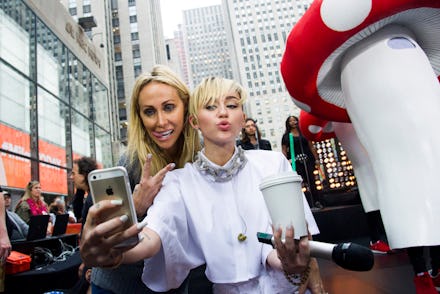Selfie-Taking, Status-Updating, Over-Sharing Millennials Oddly Demand More Privacy

Millennials are impressive — if not for our overconfidence, then for our hypocrisy. A Harvard University Institute of Politics report released on Wednesday found that while use of social media continues to explode among millennials, their opposition to the government's collection of social data is overwhelming.
The report, which surveyed thousands of millennials ages 18-29, found that young people are genererally vehemently opposed to government surveillance collection of everything from social media data, to text messages, to GPS location, to phone calls.
Why are millennials increasingly using social media if the data shows severe opposition to government data collection of their posts?
Louis C.K., in his usual candid and humorous way, points out the shifting perspectives on privacy and information sharing of this generation and ultimately its hypocrisy.
This generational shift has been happening for decades. However, the rise of social media has accelerated as society's views on privacy are changing. In 2010, Mark Zuckerberg argued that privacy is no longer a "social norm." There may be some truth in that. Our Facebook pages reveal everything about us: our favorite books, movies, what we're doing, what our friends and family are doing, where we are, etc. And with Facebook Connect, they actually know what we are doing across the web.
Facebook's implicit and explicit promise has always been that, in return for tons of ads and the ability to stalk people and easily communicate, Facebook would remain free. Edward Snowden brought to light something big we missed: Through Facebook and other social sites' data, the government has an incredibly deep psychological, political, cultural, and behavioral understanding of more than 75% of the population. It's no coincidence that sales of dystopian novel 1984 spiked by over 7000% on Amazon this summer after Edward Snowden leaked materials showing that the U.S. conducted widespread and illegal surveillance of its citizens and other nations.
How can you make an informed decision on using social media?
The U.S. government has collected more than a trillion metadata records. The National Security Agency (NSA) has direct access via programs like PRISM and EvilOlive to the servers of some of the biggest American tech companies including Apple, Facebook, and Google. These companies have worked closely with the NSA to help them circumvent encryption and other privacy controls. Snowden revealed that oversight from the Foreign Intelligence Surveillance Act (FISA) courts is inadequate. It's becoming quite clear that our digital communication is not safe from government collection and usage. So what's a young person to do?
The reality is that social media sites have very powerful reward feedback loops that have been carefully crafted by hired professionals to drive addiction. Being worried about the distant and abstract concept of information collection is hard. And in case you thought you could escape it, Snapchat's photos don't actually disappear — the NSA still has access to your snaps. If you can't beat the Facebook, Reddit, Twitter, Snapchat, Instagram, Pinterest addiction, then just remember to think before you post. Because the government is likely — definitely — taking notes.
Read more about the Harvard IOP report: Millennials Officially Hate Obama. Here's Why.